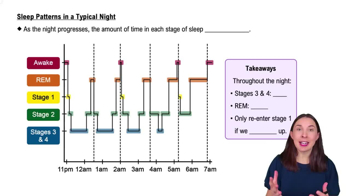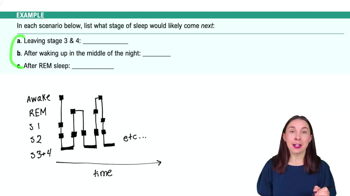Table of contents
- 1. Introduction to Psychology1h 43m
- 2. Psychology Research2h 20m
- 3. Biological Psychology2h 41m
- 4. Sensation and Perception28m
- 5. Consciousness and Sleep32m
- 6. Learning41m
- 7. Memory34m
- 8. Cognition37m
- 9. Emotion and Motivation35m
- 10. Developmental Psychology33m
- 11. Personality48m
- 12. Social Psychology41m
- 13. Stress and Health41m
- 14. Psychological Disorders44m
- 15. Treatment47m
5. Consciousness and Sleep
Sleep
Struggling with Psychology?
Join thousands of students who trust us to help them ace their exams!Watch the first videoMultiple Choice
When a person is slightly sleep deprived, _____ tasks will suffer less than _____ tasks.
A
simple; more complex
B
more complex; simple
C
motor; mental
D
mental; motor
 Verified step by step guidance
Verified step by step guidance1
Understand the context of sleep deprivation: Sleep deprivation can affect cognitive and physical performance, but the extent of the impact can vary depending on the complexity of the task.
Consider the nature of simple versus complex tasks: Simple tasks often require less cognitive effort and are more automatic, whereas complex tasks require higher cognitive functions such as problem-solving and decision-making.
Analyze the impact of sleep deprivation on task performance: Sleep deprivation tends to impair tasks that require higher cognitive functions more than those that are simple and automatic.
Differentiate between motor and mental tasks: Motor tasks involve physical actions and coordination, while mental tasks involve cognitive processes such as thinking and reasoning.
Apply the understanding to the problem: Given that sleep deprivation affects cognitive functions more, mental tasks (which are more complex) will suffer more than motor tasks (which are simpler).

 3:25m
3:25mWatch next
Master Circadian Rhythms with a bite sized video explanation from Hannah Gordils
Start learningRelated Videos
Related Practice


































































































![Race, Genes and IQ Differences | Bret Weinstein [Mini Clip]](https://img.youtube.com/vi/IztL_m3pd70/mqdefault.jpg)



































































































